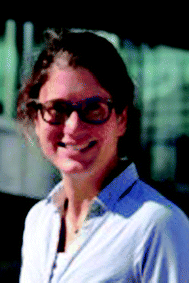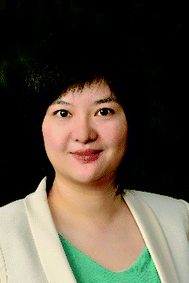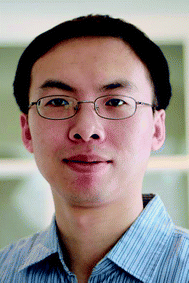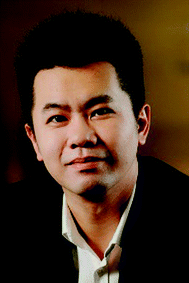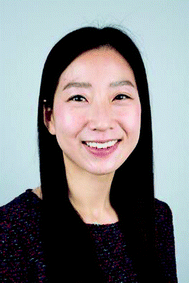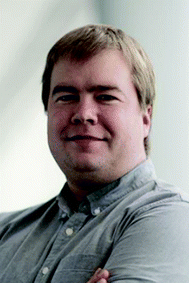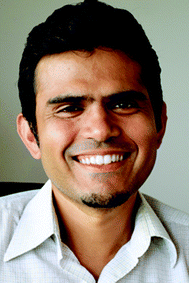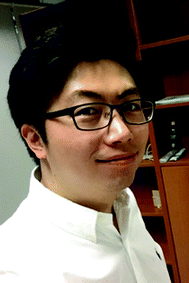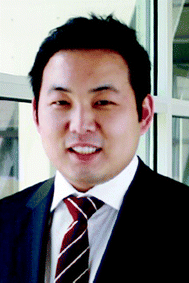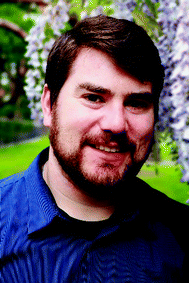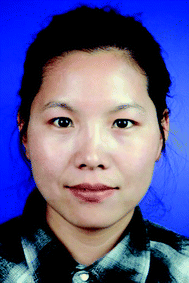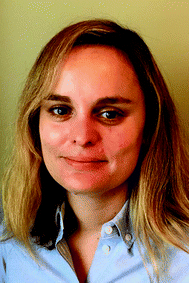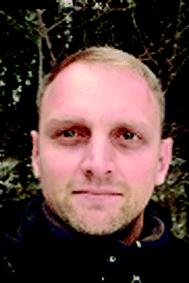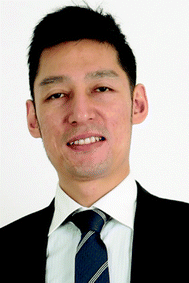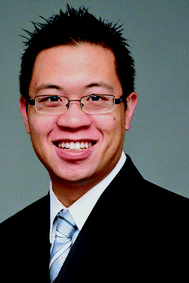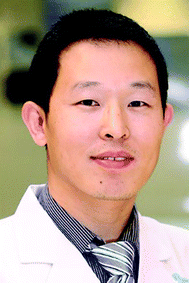DOI:
10.1039/C9TB90141H
(Profile)
J. Mater. Chem. B, 2019,
7, 6267-6270
Journal of Materials Chemistry B profiles: Contributors to the Emerging Investigators 2019 Issue
Abstract
Our 2019 Emerging Investigators themed issues gather some of the best research being conducted by scientists in the early stages of their independent career. Each contributor was recommended as carrying out work with the potential to influence future directions in materials chemistry. Congratulations to all of the researchers featured, we hope you enjoy reading this issue.
Dr Maartje M. C. Bastings trained as a Biomedical Engineer at the Eindhoven University of Technology (TU/e), and obtained her PhD in 2012, honored by the University Academic Award. She moved to the Wyss Institute of Harvard University in Boston as a NWO Rubicon and Human Frontier Science Program postdoctoral fellow, where she specialized in cellular stability of DNA-origami. Since 2017 she is heading the Programmable Bio-materials Laboratory at EPFL, Switzerland, developing precision-materials as tools to quantify fundamental mechanisms in biology.
Dr Wenjun (Rebecca) Cai is an assistant professor of Materials Science and Engineering at Virginia Tech. Her current research focuses on understanding the processing–structure–property relationships of metals and coatings under extreme conditions using experiments, analytical theory, and computer simulations. She received her Bachelor's degree from Fudan University in 2005 and her PhD from the University of Illinois at Urbana-Champaign in 2010, both in Materials Science and Engineering. She was a postdoc research associate at MIT from 2010–2012. She received the Racheff-Intel award for outstanding graduate research at UIUC in 2010, National Science Foundation CAREER award in 2015, outstanding faculty award from USF in 2016, and TMS young leaders professional development award in 2017.
Dr Zhiqiang Cao received his PhD in Chemical Engineering from the University of Washington in 2011 and was a research fellow at David H. Koch Institute for Integrative Cancer Research at Massachusetts Institute of Technology, and the Department of Anesthesiology at Children's Hospital Boston and Harvard Medical School from 2011 to 2012. He received his BEng in Polymer Materials and Engineering and MEng in Biomedical Engineering from Tianjin University, China in 2004 and 2007, respectively. He joined the Department of Chemical Engineering and Materials Science at Wayne State University in January 2013 and was promoted to Associate Professor with tenure in April 2017. His lab uses a multidisciplinary approach to study new materials and their translational applications in healthcare and biomedical engineering.
Dr Po-Yen Chen is an Assistant Professor of Chemical and Biomolecular Engineering at National University of Singapore (NUS). He completed his PhD in Chemical Engineering from Massachusetts Institute of Technology (MIT) and received a Hibbitt Independent Postdoctoral Fellowship at Brown University. He also received an AME Young Investigator Award at Singapore. Po-Yen's research group focuses on strain engineering of nanomaterials, higher dimensional patterning of 2D materials, as well as their applications in wearable technologies and smart soft robotics. We also aim to develop new robotic backbones for soft robots that integrate sensing, computation, and communication.
Dr Eun Ji Chung is an assistant professor and the Karl Jacobs Jr. and Karl Jacobs III Early-Career Chair in the Department of Biomedical Engineering at the University of Southern California, with courtesy appointments in Chemical Engineering, Medicine, and Surgery. Her laboratory is interested in developing nanoscale biomaterials for medicine. She received her BA with honors in Molecular Biology from Scripps College, her PhD from the Department of Biomedical Engineering from Northwestern University, and her postdoctoral training from the University of Chicago. She is a recipient of the K99/R00 Pathway to Independence Award and the NIH New Innovator Award.
Dr Michael J. A. Hore is an assistant professor in the Macromolecular Science & Engineering department at Case Western Reserve University. Prof. Hore earned his BS degree in Physics/Mathematical Science at The University of Memphis, and later his MS degree in Physics at The University of Memphis in 2007. He earned his PhD in Materials Science & Engineering from the University of Pennsylvania in 2012, and received a National Research Council (NRC) Postdoctoral Fellowship to perform neutron scattering measurements at the NIST Center for Neutron Research (NCNR) from 2012–2014. Recently, he has been recognized with several teaching awards, an NSF CAREER Award, the DPOLY/UKPPG Lecture Exchange Award from the American Physical Society (APS), and was named a 2018 PMSE Young Investigator by the American Chemical Society (ACS). His research group combines theory, computer simulations, and experiments to study grafted polymers, thermoresponsive materials, and nanoparticle transport.
Dr Vikram Jadhao is an assistant professor in Intelligent Systems Engineering at the School of Informatics, Computing, and Engineering at Indiana University in Bloomington. Prior to joining IU, he held postdoctoral fellowships in the Department of Physics and Astronomy at Johns Hopkins University as well as the Department of Materials Science and Engineering at Northwestern University. He received his PhD and MS in Physics from the University of Illinois at Urbana-Champaign, and his BS in Physics from the Indian Institute of Technology at Kharagpur. His current research interests are in soft materials, self-assembled nanostructures, bio-inspired systems, ionic solutions, machine learning in soft-matter engineering, and flow of polymeric materials with applications in nanomedicine and energy devices. He is a recipient of an NSF CAREER award.
Dr Jinmyoung Joo is an Assistant Professor of Biomedical Engineering at the Ulsan National Institute of Science and Technology (UNIST). He received BS (2007) and PhD (2012) degrees in Chemical Engineering from POSTECH, and then continued his studies on the functional nanomaterials for biomedical applications as a postdoctoral research associate at University of California, San Diego. He started his independent career as an Assistant Professor in the Department of Convergence Medicine at the University of Ulsan College of Medicine in 2016, and moved to the UNIST in 2019. His lab has been interested in understanding the interactions of nanomaterials with complex biological systems, and engineering novel nanostructures that can effectively understand tissue microenvironment. His lab has focuses on leveraging nanoscale materials to study biological findings and to bridge them to translational medical platforms such as bioimaging and drug delivery systems.
Dr Young Jo Kim is an assistant professor of Chemical Engineering at University of New Hampshire in Durham, NH. He leads the research group that focuses on polymeric biomaterials-based electronics and energy storage, which is broadly interested in designing the novel materials interfaces that can promote the integration of devices into the human body. He earned his PhD degree at University of Missouri, and worked as a postdoctoral associate of Materials Science and Engineering at Carnegie Mellon University in Pittsburgh, PA.
Dr Daniel King is from Philadelphia, USA and received his BS in Materials Science and Engineering from Penn State University in 2010. After graduating, he moved to the University of Massachusetts Amherst, where he completed his MS (2012) and PhD (2015) in Polymer Science and Engineering. Upon completion he moved to Sapporo, Japan, where he accepted a Tenure-track Assistant Professor position at Hokkaido University. He is a member of the Laboratory of Soft and Wet Matter, and his research focuses on developing soft composite structures and applications. Beyond research, his goal is to improve the internationality of academic research in Japan by developing collaborations between US and Japanese universities. In his free time, his hobbies include weightlifting, scuba diving, baking, and traveling.
Dr Hua Kuang is the professor of State Key Lab of Food Science and Technology, Jiangnan University. Hua Kuang received her PhD degree at China Agricultural University. She focuses on the analytical aspects of nanoassemblies and instrumental characterizations.
Dr Lorraine Leon is an Assistant Professor in the Materials Science and Engineering department at the University of Central Florida. She obtained her BS in Chemical Engineering and minors in Mathematics and Chemistry from the University of Florida. She received her PhD in Chemical Engineering from the Graduate Center of the City University of New York where she was awarded a NSF-IGERT fellowship and Graduate Teaching Fellowship. She held a postdoctoral appointment at the Institute for Molecular Engineering at the University of Chicago and Argonne National Laboratory. Dr Leon is an experimentalist with research interests at the intersection of biomaterials and polymer science ranging from nanomedicine to the templating of inorganic materials. Her lab is focused on expanding the self-assembly toolbox to include multiple, synergistic molecular interactions using biomolecules, particularly peptides and peptide/polymer conjugates.
Dr Scott G. Mitchell is a Tenured Senior Scientist at the Aragón Materials Science Institute (ICMA), Zaragoza, Spain. He studied chemistry at the University of Glasgow (UK), including an Erasmus placement with Prof. Martin Kotora at Charles University, Prague, Czech Republic. He received his PhD in 2010 from the University of Glasgow under guidance of Prof. Lee Cronin. After post-doctoral work in the Cronin Group from 2010-2011, he held a
Juan de la Cierva fellowship followed by a Marie Curie Intra-European Fellowship at the University of Zaragoza during the period 2012–2015. He joined the ICMA with a three-year ComFuturo Project in 2015 and obtained a tenured position in the Consejo Superior de Investigaciones Científicas (CSIC) in 2018. His research interests involve using fundamental synthetic chemistry (nanoparticles, polyoxometalates and polymeric materials) for specific biotechnological applications and to address biodeterioration issues in cultural heritage conservation.
Dr Luis Muehlmann is Assistant Professor of Biochemistry in the University of Brasília, Brazil, since 2014. He graduated as a biochemist from the Federal University of Parana, Brazil, (2006), and holds a Master’s degree in Cell Biology (2008) from the same university, and PhD in Nanobiotechnology (2011) from the University of Brasília. His main publications are in the area of interactions of nanostructures with biological cells. Currently, Muehlmann works on the development of nanocarriers for cancer chemotherapeutic drugs, organelle-targeted drug delivery, and immunogenic cell death induction.
Dr Tomoki Nishimura is an assistant professor at the department of polymer chemistry, graduate school of engineering at Kyoto University, Japan from 2018. He carried out his PhD under the guidance of Prof. Kazuo Sakurai at the University of Kitakyushu, Japan. He subsequently joined the group of Prof. Tony D. James (the University of Bath, UK) as a JSPS postdoctoral researcher in 2010. In 2012, He joined the Akiyoshi bio-nanotransporter project, led by Prof. Kazunari Akiyoshi, at Kyoto University. His current research interests include the development of functional polymer materials for biomedical applications.
Dr Ian Y. Wong is an Assistant Professor of Engineering and of Medical Science at Brown University. He completed his PhD in Materials Science and Engineering from Stanford University as an NSF Graduate Research Fellow. He then completed postdoctoral training as a Damon Runyon Cancer Research Fellow at Massachusetts General Hospital and Harvard Medical School. His research group engineers interfacial biomaterials and microfluidics to elucidate tumor invasion, drug resistance, and heterogeneity. He also explores unconventional fabrication techniques for self-assembly and patterning of 2D nanomaterials. He has received the Brown University Pierrepont Award for Outstanding Advising.
Dr Yunlong Zhou is a professor of Wenzhou Institute in University of Chinese Academy of Sciences and Department of Biomedical Engineering in Wenzhou Medical University. He received his PhD degree from National Center for Nanoscience and Nanotechnology, Chinese Academy of Sciences (2010). Then he worked in the Department of Chemical Engineering, University of Michigan and Department of Nanomedicine, Houston Methodist Hospital as a postdoctoral researcher (2010–2014). His research explores the engineering of biointerfaces between nanomaterials and biomolecules including self-assembly of chiral inorganic nanoparticles, building of inorganic nanoparticle hydrogels, designing of peptide mimetics and advanced smart nanomaterials. His scientific career is pursuing developing new concepts in physical chemistry and contribution to life sciences and technologies.
|
| This journal is © The Royal Society of Chemistry 2019 |
Click here to see how this site uses Cookies. View our privacy policy here. 
